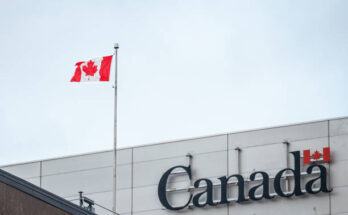Opportunities for Sponsorship for US Visas. Many people have the dream of living and working in the United States. The good news is that there are opportunities for skilled workers to sponsor their U.S. visas, making this dream a reality.
For eligible foreign workers, employers nationwide sponsor visas, providing an avenue for a career in the United States. This guide will equip you with the knowledge and resources to find these sponsorship opportunities.
What is Visa Sponsorship?
In essence, visa sponsorship serves as a vouching system for foreign nationals looking to enter or remain in a specific nation for an extended period. When it comes to employment, a foreign worker’s visa application is usually supported by their employer in the host nation (such as the United States).
Here’s a breakdown of the key players involved:
- Sponsor: This could be a person or an organization, but in the context of the United States, it’s typically a U.S. employer.
advocating for a foreign worker’s visa. In other cases, a family member sponsoring a relative or a university sponsoring a student visa could occur. - Foreign National: This person is someone who needs a visa to enter or stay in the host nation (such as the United States).
- Visa: This formal document grants permission for the foreign national to enter the country for a predetermined period and purpose (study, work, etc.).
The sponsorship process involves two main aspects:
-
Support and Advocacy: In his capacity as an advocate, the sponsor makes the foreign national’s case to the authorities. Documentation such as the job offer, the foreign worker’s qualifications, and occasionally proof that no qualified U.S. citizen could fill the position are usually required for this (especially for employment-based visas).
-
Responsibility: A certain amount of care is given to the foreign visitor by the sponsor while they are there. This could entail making sure they abide by the laws and regulations regarding immigration.
Sponsorship of visas has benefits for both foreign employees and employers. Foreign employees can live and work in the host nation, and employers can access a larger talent pool. Nevertheless, depending on the particular visa category, the procedure may be intricate and different.
Who is Eligible For Visa Sponsorship?
Eligibility for visa sponsorship depends on two main factors:
-
Visa Category: There are various visa categories in the U.S. immigration system, each with its own eligibility requirements. Common work visas requiring sponsorship include H-1B for specialty occupations, H-2B for temporary non-agricultural workers, and L-1 for intracompany transfers.
-
Foreign National Qualifications: The foreign national must meet the specific qualifications outlined for the visa category. This typically involves possessing a certain level of education and experience relevant to the job offer. Some visas, like the EB-1 for aliens of extraordinary ability, have exceptionally high bars for qualification.
Here’s a more detailed breakdown of eligibility:
For Employers (Sponsors):
- Legal Status: The employer must be a legally registered business in the U.S.
- Compliance History: The employer should have a good record of compliance with immigration laws and regulations.
- Financial Ability: The employer must demonstrate financial capability to pay the foreign worker the offered wage and cover any visa-related fees.
- Job Availability: In some cases, the employer might need to prove they made a good faith effort to recruit U.S. citizens before offering the position to a foreign worker.
For Foreign Nationals:
- Job Offer: The foreign national must have a valid job offer from a qualifying U.S. employer.
- Qualifications: The foreign national’s education and experience must meet the specific requirements of the visa category.
- Clean Record: They should have a clean criminal and immigration background.
Additional Considerations:
- Labor Certification: Some visa categories, like H-1B, require labor certification from the U.S. Department of Labor, verifying that employing a foreign worker won’t adversely affect U.S. workers’ wages and working conditions.
- Prevailing Wage: The offered wage must meet or exceed the prevailing wage for the specific occupation in the geographic area.
It’s important to consult with an immigration attorney to determine the most suitable visa category and ensure eligibility for both the employer and the foreign worker.
Types of U.S. Visas Sponsored by Employers
Several types of U.S. visas require sponsorship from a U.S. employer. Here’s a breakdown of some of the most common ones:
1. H-1B Visa: This visa is for foreign workers in specialty occupations who possess theoretical and practical knowledge of a specific body of highly specialized knowledge. These occupations typically require a bachelor’s degree or its equivalent in a specific specialty. Common H-1 B-sponsored jobs include engineers, computer programmers, architects, scientists, and researchers.
2. H-2A Visa: This visa caters to temporary agricultural workers performing seasonal or one-time labor services in the U.S. The employer must demonstrate a lack of qualified U.S. workers available for the specific agricultural tasks.
3. H-2B Visa: Similar to H-2A, this visa is for temporary non-agricultural workers filling positions with a temporary need or peak workload. Examples include landscaping, construction, hospitality, and certain seafood processing jobs.
4. L-1 Visa: This visa category facilitates intracompany transfers of employees between a foreign company and its affiliated branch, parent, subsidiary, or sister company in the U.S. The L-1A visa is for managers and executives, while the L-1B is for employees with specialized knowledge essential to the company’s operations.
5. O-1 Visa: The O-1 visa is for individuals with extraordinary ability in the sciences, arts, education, business, or athletics. This visa caters to prominent researchers, artists, athletes, and business leaders.
6. TN Visa: The TN visa is established under the North American Free Trade Agreement (NAFTA) for Mexican and Canadian citizens working in specific professional occupations listed under the agreement. This visa allows for the temporary movement of professionals across the borders.
7. E-1 Visa: This visa is designed for treaty traders, individuals from countries with a trade treaty with the U.S., who are coming to engage in substantial trade between the U.S. and their home country.
8. E-2 Visa: This visa is for treaty investors, individuals from countries with a trade treaty with the U.S., who are coming to develop and manage a business they have invested a substantial amount of capital in.
Important Note: The relevant visa type will depend on the particular job offer, the foreign worker’s qualifications, and the nature of the employer-employee relationship. This is not an exhaustive list; there are other employer-sponsored visa categories available.
What Documents Do You Need For U.S Sponsorship?
The documents required for U.S. visa sponsorship depend on the specific visa category being applied for. However, there are some general documents typically needed by both the employer (sponsor) and the foreign national (beneficiary):
For the Employer (Sponsor):
- Proof of Business Legitimacy: Documents like business registration, tax filings, and financial statements demonstrating a legitimate and operating business.
- Good Standing with Immigration: Records indicating no prior immigration violations.
- Job Offer Details: A formal written job offer outlining the position, salary, benefits, and minimum qualifications.
- Labor Certification (if applicable): A document from the U.S. Department of Labor (DOL) for certain visas (like H-1B) verifying the job offer won’t negatively impact U.S. workers’ wages and working conditions.
For the Foreign National (Beneficiary):
- Valid Passport: A valid passport from their home country with sufficient validity beyond the intended period of stay in the U.S.
- Proof of Qualifications: Educational degrees, diplomas, certificates, or work experience documents relevant to the job offer and visa category.
- Curriculum Vitae (CV) or Resume: A detailed document outlining the foreign national’s education and work experience.
- Foreign Medical Examination Report: Proof of a medical examination conducted by a U.S. government-approved physician.
- Criminal Background Check: Documentation showing a clear criminal record.
Additional Documents (may vary by visa category):
- Evidence of Extraordinary Ability (O-1 Visa): Documentation showcasing the foreign national’s extraordinary achievements and recognition in their field (for O-1 visas).
- Investment Proof (E-2 Visa): Evidence of substantial investment in a U.S. business (for E-2 visas).
- Treaty Trader/Investor Documentation (E-1/E-2 Visa): Proof of nationality from a country with a trade treaty with the U.S. (for E-1/E-2 visas).
Important Note: This isn’t a comprehensive list. It is essential to speak with an immigration lawyer to find out which precise documents are required for the particular visa category being applied for. They can walk you through the precise specifications and make sure all the required paperwork is correctly assembled.
Top Companies Offering Visa Sponsorship
Finding the “best” businesses to sponsor a visa can be difficult and depends on several variables, including your field, where you want to go, and the available visa options. Nonetheless, the following businesses are well-known for regularly supporting visas in a variety of industries:
Tech:
- Amazon
- Microsoft
- Apple
- Meta (Facebook)
- Netflix
- Uber
- Airbnb
- Tesla
Finance and Consulting:
- Deloitte
- KPMG
- PwC
- EY
- Goldman Sachs
- JPMorgan Chase
- Citigroup
- Morgan Stanley
- Bank of America Merrill Lynch
- McKinsey & Company
Healthcare:
- Mayo Clinic
- Cleveland Clinic
- Johns Hopkins Medicine
- Massachusetts General Hospital
- Stanford Health Care
- UCLA Health
- NYU Langone Health
- Kaiser Permanente
- HCA Healthcare
- Ascension
Science and Engineering:
- Boeing
- Lockheed Martin
- Raytheon Technologies
- ExxonMobil
- Chevron
- Schlumberger
- Caterpillar
- General Electric
- Siemens
- Dow Chemical
Other:
- Hilton Worldwide Holdings
- Marriott International
- Hyatt Hotels Corporation
- Yum! Brands (KFC, Pizza Hut, Taco Bell)
- Starbucks
- McDonald’s
- Unilever
- Nestlé
- Procter & Gamble
- Coca-Cola
How Much Bank Balance is Required for US visa?
The amount of bank balance required for a US visa doesn’t have a fixed minimum, but consular officers will assess your financial situation to determine if you have sufficient funds to support yourself during your stay in the US. They consider several factors, including:
- Purpose of visit: Tourist visas might require less compared to business or study visas, which involve longer stays and potentially higher expenses.
- Length of stay: The longer you plan to stay, the more money you’ll need to show.
- Proof of income and employment: This demonstrates your ability to financially support yourself.
- Travel arrangements and accommodation: Pre-booked flights and hotel reservations can strengthen your case.
- Sponsorship: If you have a sponsor in the US, their financial standing may also be considered.
Here’s a general recommendation:
- Tourist visa: Aim for a balance of $6,000 to $10,000, excluding flight and travel insurance costs.
- Business visa: $10,000 or more, depending on the nature and duration of your business trip.
- Student visa: Evidence of sufficient funds to cover tuition, living expenses, and return travel for the entire study period. This could range from $10,000 to $30,000 or more per year.
Important tips:
- Maintain a consistent bank balance: Don’t make a big deposit just before submitting your application. Display a consistent income stream over several months.
- Provide bank statements: To prove your stability, provide bank statements covering the last three to six months.
- Explain large deposits: Be ready to explain any sizable deposits you may have made to your account.
Recall that these are only suggestions. Speak with an immigration lawyer or visa consultant to find out how much bank balance you’ll need. They can evaluate your particular circumstance and offer you advice on the best way forward.


